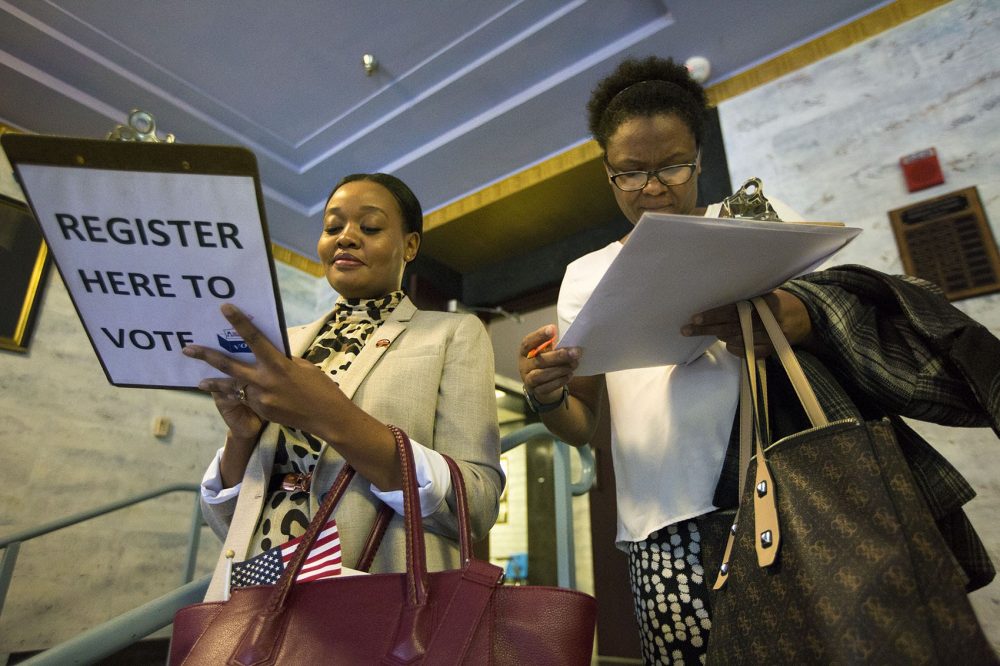Advertisement
In Massachusetts, Protecting Voting Rights In The Age Of Trump

COMMENTARY
Let’s set the record straight: There is no evidence that millions of people voted illegally in the 2016 election. President Trump’s baseless claims of extensive voter fraud and calls for some sort of federal investigation weaken confidence in our electoral process. They also encourage the adoption of restrictive voting laws throughout the country, which might be the new president’s ultimate intent.
The problem with the 2016 election was not that too many people voted. It is that too few of us did. The solution, as President Obama noted in his farewell address, is a bipartisan effort to make “it easier, not harder, to vote.” Massachusetts should lead the way.
American voting rights took a major hit in 2013 when the United States Supreme Court, in Shelby County v. Holder, gutted a key provision of the Voting Rights Act of 1965. That provision required localities with a history of voter discrimination to seek the approval of the United States Department of Justice before changing their voting laws. According to the Brennan Center for Justice, the Court’s decision “removed an effective deterrent against harmful election law changes.” Against this backdrop of a weakened Voting Rights Act and a new Trump administration, the task of making it easier and fairer to vote falls to the states.
The problem with the 2016 election was not that too many people voted. It is that too few of us did.
Here in Massachusetts, we saw the positive results that valuing inclusion and participation in our democratic process can yield when early voting in the commonwealth was implemented last fall. That convenience proved popular, as last year over one million people cast early ballots in Massachusetts, approximately 21 percent of the state electorate. Massachusetts has also recently established an online voter registration system, making it simpler to add your name to the voter rolls. These changes stem from 2014 electoral reforms signed into law by then-Gov. Deval Patrick, which moved Massachusetts from among the worst states for ballot access and voter participation (42nd) to among the better (tied for 10th).
But we should not rest on our laurels. Now is the time for Massachusetts to take the next step and implement an automatic voter registration system. Six states — Alaska, California, Connecticut, Oregon, Vermont and West Virginia — have already done so. Under most automatic systems, eligible citizens who interact with select state agencies, such as the Department of Motor Vehicles, will be added to the voting rolls unless they opt out. Simply put, if you interact with government, you are registered to have a say on how it works, unless you choose otherwise.
A bill to enact an automatic voter registration system has failed to make it through the state Legislature in the past. Good government organizations like Common Cause Massachusetts, which has called this issue its top legislative priority for the new legislative session, are thankfully pushing forward this session. Our elected officials — including Secretary of the State William Galvin, who administers our voting laws and has yet to articulate a position on such a system — should strongly support it. City and town clerks should welcome it, too, as it would simplify voter rolls and save on administrative costs. If there are municipal implementation costs, they should be provided for in any final legislation.
We do not have to look beyond our borders to find threats to our democratic institutions in the form of restrictive voting laws and a president who makes baseless claims of voter fraud.
The issue of Russian intervention in our electoral process has recently and understandably been the focus of much discussion. Sadly, however, we do not have to look beyond our borders to find threats to our democratic institutions in the form of restrictive voting laws and a president who makes baseless claims of voter fraud.
Some states around the nation are likely to further restrict access to the polls in the years ahead. But here in the cradle of American democracy, Massachusetts can advance to the forefront of fairness and inclusion in voting rights by adopting an automatic voter registration system.
